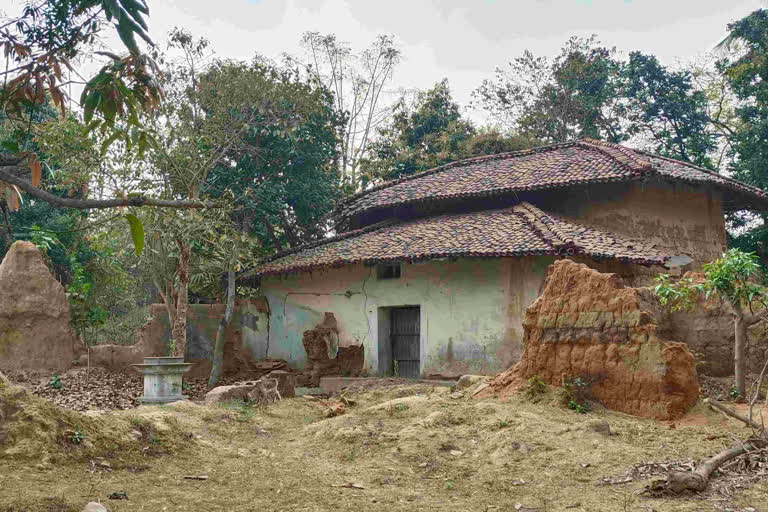Birbhum (West Bengal): Silence surrounds Patalpur. The village, situated near the Jharkhand border in West Bengal's Birbhum district, at present exists solely on official records as majority of its official population of 25 to 30 households have deserted the hamlet due to a long running and unresolved, wildlife crisis. A walk through the habitation brings to the fore abandoned houses, courtyards, mills, tulsi shrines lying around.
The eerie silence in the village only gets shattered with the deafening trumpet and heavy footsteps of wild elephants which often bulldoze houses and destroy crop when they enter the village from the nearby forest in search of food.
Out of its 100-plus population, two families remain. Ujjal Das, head of one of the two in question, narrates tusk-bearing trouble that drove out erstwhile residents from Patalpur, flanked by the Siddeshwari river on one side and located near the forested foothills that connect the area with neighboring Jharkhand. Elephants often enter the village at night in search of food, Das says, adding that the tuskers destroy crops and houses alike.
The exodus started around 2008-09, he said blaming the dual blow of elephant attacks and government apathy for the situation. "We are the two families living now. Everyone has left the village because of the fear of elephants. All the houses are destroyed. Elephants enter in groups day in and day out, they came even a few days ago, but did not enter the village. There is no government facility either. If the elephants damage property worth Rs 1 lakh, a resident gets compensation of onlt Rs 5,000" Das explains.
Also read:Elephant kills 16 in 12 days in Jharkhand; forest officials impose Section 144 in Ranchi
Despite the risk of disaster, Das adds that he's had to continue producing crops to feed his family. In both 2017 and 2022, the former won the 'Krishak Ratna' award from the West Bengal government. When asked, he proudly adds beans, potatoes, coriander, sugarcane, maize, mustard and mango to his list of harvests in the current season.
Das pales when speaking about coming days, admitting he does not have a way out. "Where will I go? Who will buy my land and deposits in this village? And I have no money to go and live in another place. So I will spend the rest of my life in this village, albeit in fear. If I am attacked by elephants, I will die" he states.
"Herds of elephants enter Yakham village and destroy everything. One day I saw an elephant come and break the door of my house with its head. I had my back against the wall. It put its trunk through the door, searched for food inside, took it and left. It was akin to coming back from the brink of death. Everyone knows this, the village is empty today due to this fear. Informing the forest department does not help" Bablu Das, another resident, said.
When apprised of the terror of the last among the villagers, Kudrate Khoda, Ranger of the Rajnagar Range, however was unable to point toward any solid plans to tackle the issue. "Elephants almost always enter the village after crossing the forest. Now we drive the elephants away from the locality by sounding the siren of a car called 'Airabat'. We urge people to not go near the elephants. We also have personnel identified as 'Gajmitra' in the area, who alert us when elephants come.
